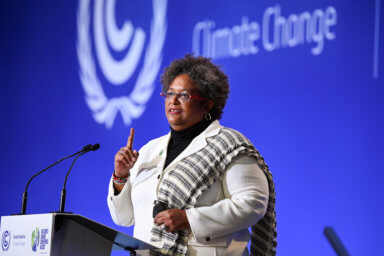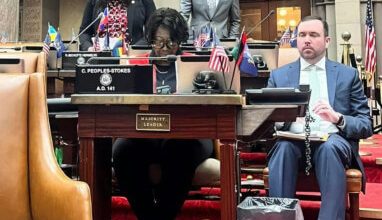World
Caribbean RoundUp

ANTIGUA
A 49-year-old “fully vaccinated ” man died at the Sir Lester Bird Medical Centre (SLBMC) nearly two months after he was admitted to the health institution, as other Caribbean Community (CARICOM) countries registered more deaths linked to the COVID-19 virus.
SLBMC Medical Director, Dr. Albert Duncan said a patient who was tested positive for COVID-19 has died at the at the SLBMC recently. He was “fully vaccinated.”
As a result, Antigua and Barbuda has recorded so far 99 deaths and close to 4,000 positive cases linked to the virus since the first case was detected in March last year.
Trinidad and Tobago has recorded more than 1,700 deaths just about 58, 000 positive cases since the first case was detected in March last year.
BARBADOS
The Barbados government has announced plans for the establishment of safe zones as the island continues to be impacted by the COVID-19 virus that has claimed so far 145 deaths and more than 16,000 cases since March last year.
Prime Minister Mia Mottley, in a radio and television broadcast recently said that her administration had decided against further lockdowns and that it was now necessary to protect those who are talking the vaccine.
“The realty is that we are satisfied that we need now at this stage to start the process of the creation of safe zones. We need to have places where persons are either vaccinated or recently tested,” she said.
Mottley said the creation of those safe zones will first target care workers in the first instance, followed by frontline workers, along with those in the tourism and education sectors.
She said the government is hoping that over a period of time, people employed in the restaurant and entertainment sectors, as well as worshipers, will be included in the creation of safe zones.
The prime minister said that officials were satisfied that they need to start the process of creating safe zones, where persons were either vaccinated or frequently tested.
Mottley said the process of establishing safe zones would be led by the Ministry of Health and Wellness.
CARIBBEAN
The International Monetary Fund (IMF) said the first economic policy for Caribbean countries hard hit by the COVID-19 virus is to improve health conditions and accelerate vaccination campaigns to bring the pandemic under control.
Acting IMF’s Western Hemisphere Director, Nigel Chalk said increased access vaccination would save lives, prevent new variants from emerging and hasten the recovery.
He said to bolster credibility, spending in those areas will need to be couched within a transparent medium-term fiscal framework and in some cases, will need to be offset by greater efficiency in spending in other areas.
He agreed that the “pandemic has hit hard the population in many countries,” given that the economies of many Caribbean countries are highly dependent on tourism and are currently sorting out the appropriate timing and scale of unwinding the extraordinary COVID-19 pandemic.
The IMF official said countries needed to think fast and act fast.
Chalk noted that energy and food prices have risen sharply in 2021 and that Caribbean countries are still facing high debt and pleading for concessions as they seek to survive in the near and medium term.
GUYANA
A union that represents workers in the oil and gas sector has expressed concern over the number of foreigners being employed in the industry.
In a statement, the Guyana Agriculture and General Workers Union (GAWU) said it was shocked to learn that foreigners continue to penetrate the local oil industry and are being given preference over Guyanese workers.
According to the union, while there are reports that Guyanese are not qualified to do certain jobs within the sector, work which Guyanese workers can undertake are also being given to foreigners.
GAWU reminded that Guyanese are competent and skilled enough to be given jobs in the oil sector.
Recently, several government ministers implored oil companies to hire sugar workers who were displaced.
The union complained that foreign workers are reportedly benefiting from housing, subsistence and other allowances while local workers are not provided with the same.
HAITI
The United Nations Children’s Fund (UNICEF) has warned that the number of children and women abducted in Haiti up to the end of August has already surpassed last year’s total.
According to UNICEF Regional Director for Latin America and the Caribbean, Jean Gough, “nowhere is safe for children in Haiti anymore.”
UNICEF estimated, based on official sources, that 71 women and 40 children were abducted in the first eight months of this year, up from 59 women and 37 children last year.
The number represents one-third of the 455 kidnappings reported, UNICEF said.
It said most of the kidnappings are taking place in the capital city of Port-au-Prince and most abductees are Haitian.
Since June, UNICEF said gang violence in the area has displaced 19,000 people and affected 1.5 million.
In the first half of October alone, 119 people were abducted, UNICEF said.
On Oct. 16, it noted that 17 missionaries from the USA and Canada were kidnapped.
The missionaries were returning from a visit to an orphanage when their bus was reportedly seized by members of the 400 Mazowo gang, UNICEF said.
A ransom of US$17 has been demanded for their release.
JAMAICA
Jamaica has recorded more than 1,000 murders in the first 10 months of this year, according to figures released by the Jamaica Constabulary Force (JCF)
It said as of Oct. 23, the murder toll stood at 1,157, an increase of 110 or a 10.5 percent increase when compared with the corresponding period last year.
But the JFC noted that the total number of serious and violent crimes committed so far for this year has declined by 8.8 percent, with 3,50 serious and violent crimes being reported as compared with 4,221 last year.
The authorities have also reported that there was a marginal increase in the number of shooting incidents, with 1,027 cases of shootings so far this year, compared to 1,023 for the same period last year, a .o4 percent increase.
TRINIDAD
Health officials in Trinidad and Tobago are expressing concern over the rising number of COVID-19 daily deaths and positive cases over the past month
In just a week, 60 persons have died from the COVID-19 virus, taking the death toll to close to 1,800. There were also 1,252 new COVID cases in five days, the Ministry of Health reported. There were 76 deaths from the virus in the first week of this month.
The Ministry of Health reported that COVID-19 cases are increasing since the start of the pandemic in March last year.
And in the sister isle of Tobago, there were more than 100 deaths.
There are now 5,200 active cases of the virus.
Last week, Prime Minister Dr. Keith Rowley announced that at the end of the month, Trinidad and Tobago will no longer be under a state of emergency (SoE) and no longer have a curfew in place.
Rowley said that he will no longer be seeking another extension, which has been in place since May to control the spread of the COVID-19 virus.
The SoE was originally declared by President Paula-Mae Weekes on May 15.
The first three-month extension expired on Aug. 29 and a second one. which was extended will expire at the end of November.
— Compiled by Azad Ali



